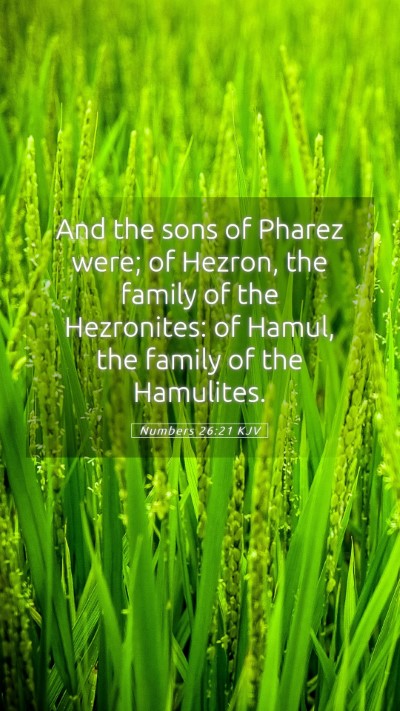Understanding Numbers 26:21: Insights and Exegesis
Bible Verse: Numbers 26:21 - "These are the families of the Zebulunites according to those who were numbered of them, sixty thousand and five hundred."
Overview of the Verse
In Numbers 26:21, the scripture presents the results of a census conducted among the people of Israel, specifically focusing on the tribe of Zebulun. The mention of the number sixty thousand and five hundred highlights the growth and importance of this tribe among the Israelites during their wilderness journey.
Commentary Insights
Combined insights from public domain commentaries such as those by Matthew Henry, Albert Barnes, and Adam Clarke shed light on various aspects of this verse.
Matthew Henry’s Commentary
Matthew Henry notes that this census serves a dual purpose: it offers an account of the Israelite population and establishes the organization of tribes for the allocation of land in Canaan. The tribe of Zebulun, with its significant number, reflects God’s faithfulness in maintaining and blessing His people, even in the hardships of the wilderness. Understanding the significance of each tribe provides important context for biblical history and prophecy.
Albert Barnes’ Commentary
According to Albert Barnes, the numbering of the Zebulunites signifies strength and a measure of military potential. The tribe of Zebulun was known for its seafaring skills, indicating an economic and strategic position. This population number contributes to the understanding of Israel’s military capabilities and territorial claims in the Promised Land. Barnes connects the current state of the tribe with promises made to Jacob, emphasizing continuity in God’s covenant with his people.
Adam Clarke’s Commentary
Adam Clarke provides an analysis that underscores the sociopolitical context of this verse. The large number of men suggests that Zebulun held a prominent role in the community of tribes. Clarke highlights the importance of family and lineage in Israelite society, where each tribe's strength could impact collective security and prosperity. The mention of zebulun also relates to Jacob’s prophecy, indicating the fulfillment of God’s promises.
Thematic Significance
Overall, Numbers 26:21 encapsulates themes of:
- Faithfulness: God’s unwavering commitment to His people is evident in the numerical strength of Zebulun.
- Identity: The census not only identifies the families but also affirms the tribal identity that is central to Israelite culture.
- Community Organization: Accurate counting is crucial for managing the community’s needs and responsibilities, particularly in military and land distribution contexts.
Application in Modern Context
Understanding Numbers 26:21 can guide contemporary readers in several ways:
- Reflection on Growth: Similar to the tribe of Zebulun, communities today may reflect on how growth in numbers impacts identity and culture.
- Importance of Heritage: The verse reminds us to value familial and community legacies in shaping identity.
- God’s Promises: Believers can find assurance in the historical faithfulness of God regarding His promises and blessings.
Cross References
This verse is connected to several important passages that deepen its understanding:
- Genesis 49:13: Jacob's prophecy concerning Zebulun.
- Deuteronomy 33:18-19: Moses' blessing on the tribe of Zebulun.
- Numbers 1:30-31: The initial census of the tribes of Israel.
Conclusion
Numbers 26:21 presents a rich tapestry of meaning within the context of the Israelite journey, reflecting on themes of identity, divine promise, and community organization. By engaging with various commentaries, readers can enrich their understanding of scripture, realizing the relevance of these ancient texts to modern faith and community contexts.
Incorporating this verse into bible study groups or online Bible study settings can foster discussion around how communal identity and God’s faithfulness play roles in believers’ lives today.


